odometer HYUNDAI TUCSON 2010 Owners Manual
[x] Cancel search | Manufacturer: HYUNDAI, Model Year: 2010, Model line: TUCSON, Model: HYUNDAI TUCSON 2010Pages: 382, PDF Size: 7.39 MB
Page 116 of 382
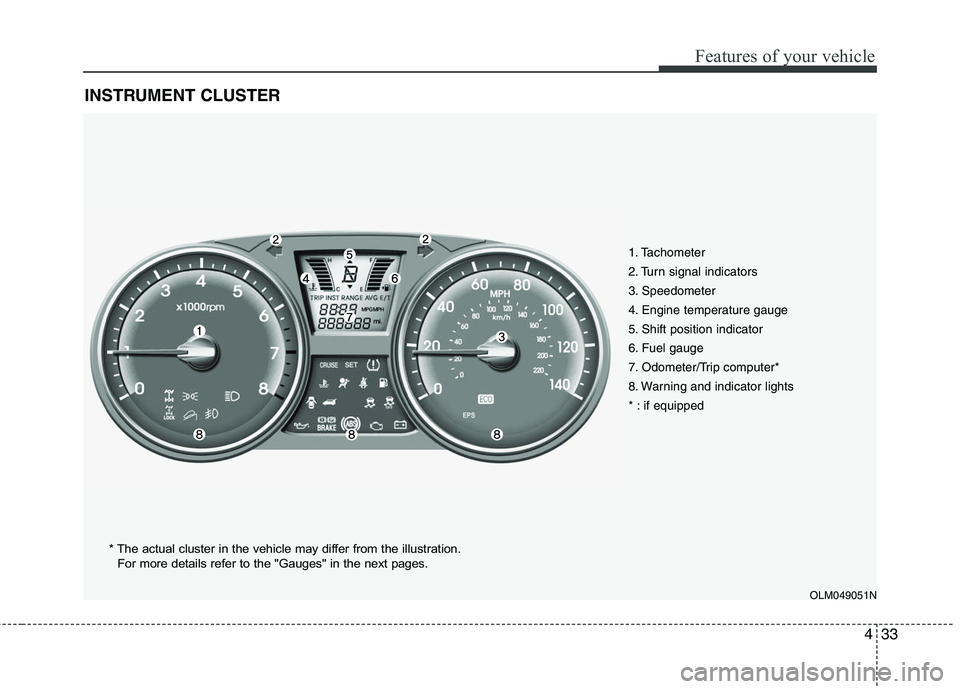
433
Features of your vehicle
INSTRUMENT CLUSTER
1. Tachometer
2. Turn signal indicators
3. Speedometer
4. Engine temperature gauge
5. Shift position indicator
6. Fuel gauge
7. Odometer/Trip computer*
8. Warning and indicator lights
* : if equipped
OLM049051N
* The actual cluster in the vehicle may differ from the illustration.For more details refer to the "Gauges" in the next pages.
Page 119 of 382
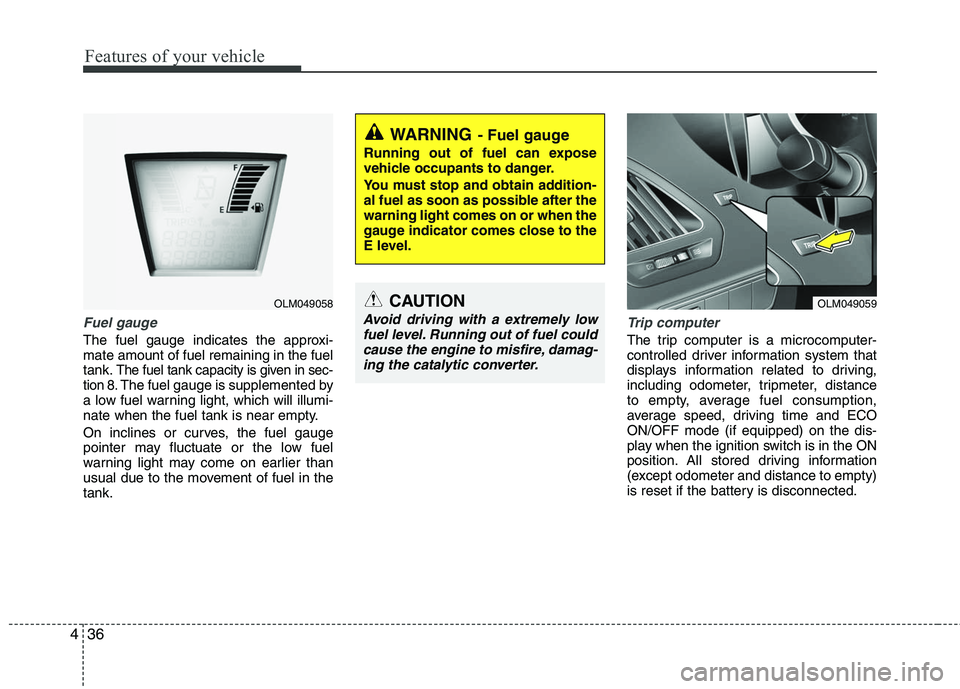
Features of your vehicle
36
4
Fuel gauge
The fuel gauge indicates the approxi-
mate amount of fuel remaining in the fuel
tank.
The fuel tank capacity is given in sec-
tion 8.The fuel gauge is supplemented by
a low fuel warning light, which will illumi-
nate when the fuel tank is near empty.
On inclines or curves, the fuel gauge
pointer may fluctuate or the low fuel
warning light may come on earlier than
usual due to the movement of fuel in the
tank.
Trip computer
The trip computer is a microcomputer-
controlled driver information system that
displays information related to driving,
including odometer, tripmeter, distance
to empty, average fuel consumption,
average speed, driving time and ECO
ON/OFF mode (if equipped) on the dis-
play when the ignition switch is in the ON
position. All stored driving information
(except odometer and distance to empty)
is reset if the battery is disconnected.
WARNING- Fuel gauge
Running out of fuel can expose
vehicle occupants to danger.
You must stop and obtain addition-
al fuel as soon as possible after the
warning light comes on or when the
gauge indicator comes close to the
E level.
CAUTION
Avoid driving with a extremely low fuel level. Running out of fuel couldcause the engine to misfire, damag-ing the catalytic converter.
OLM049058
OLM049059
Page 120 of 382
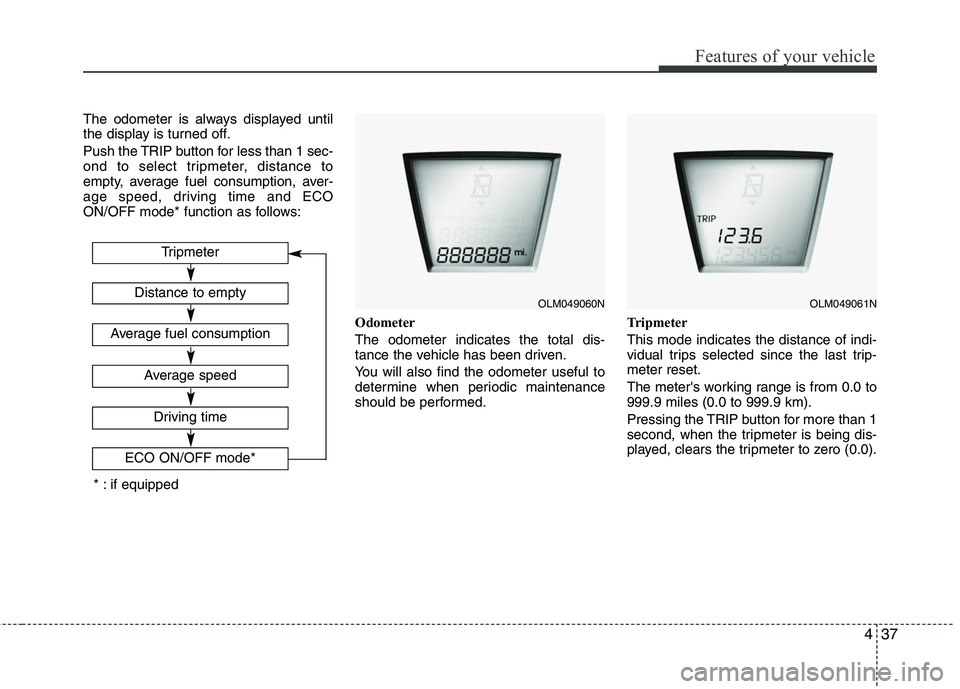
437
Features of your vehicle
The odometer is always displayed until
the display is turned off.
Push the TRIP button for less than 1 sec-
ond to select tripmeter, distance to
empty, average fuel consumption, aver-
age speed, driving time and ECO
ON/OFF mode* function as follows:Odometer
The odometer indicates the total dis-
tance the vehicle has been driven.
You will also find the odometer useful to
determine when periodic maintenance
should be performed.Tripmeter
This mode indicates the distance of indi-
vidual trips selected since the last trip-
meter reset.
The meter's working range is from 0.0 to
999.9 miles (0.0 to 999.9 km).
Pressing the TRIP button for more than 1
second, when the tripmeter is being dis-
played, clears the tripmeter to zero (0.0).
OLM049060N
OLM049061N
Tripmeter
Driving time
ECO ON/OFF mode*
Distance to empty
Average fuel consumption
Average speed
* : if equipped
Page 122 of 382
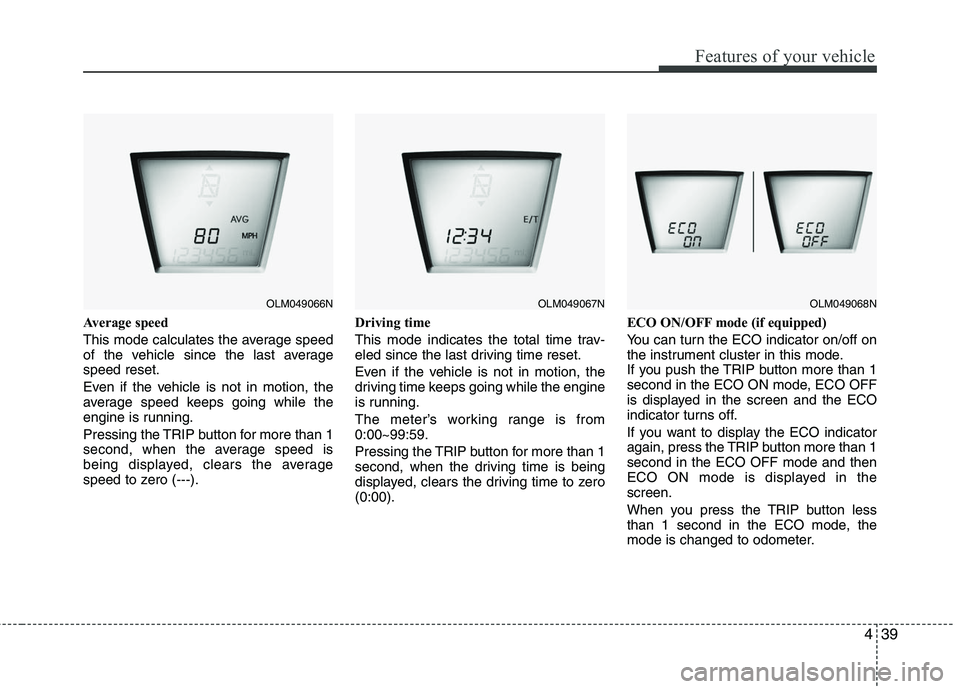
439
Features of your vehicle
Average speed
This mode calculates the average speed
of the vehicle since the last average
speed reset.
Even if the vehicle is not in motion, the
average speed keeps going while the
engine is running.
Pressing the TRIP button for more than 1
second, when the average speed is
being displayed, clears the average
speed to zero (---).Driving time
This mode indicates the total time trav-
eled since the last driving time reset.
Even if the vehicle is not in motion, the
driving time keeps going while the engine
is running.
The meter’s working range is from
0:00~99:59.
Pressing the TRIP button for more than 1
second, when the driving time is being
displayed, clears the driving time to zero
(0:00).ECO ON/OFF mode (if equipped)
You can turn the ECO indicator on/off on
the instrument cluster in this mode.
If you push the TRIP button more than 1
second in the ECO ON mode, ECO OFF
is displayed in the screen and the ECO
indicator turns off.
If you want to display the ECO indicator
again, press the TRIP button more than 1
second in the ECO OFF mode and then
ECO ON mode is displayed in the
screen.
When you press the TRIP button less
than 1 second in the ECO mode, the
mode is changed to odometer.
OLM049066N
OLM049067N
OLM049068N
Page 124 of 382
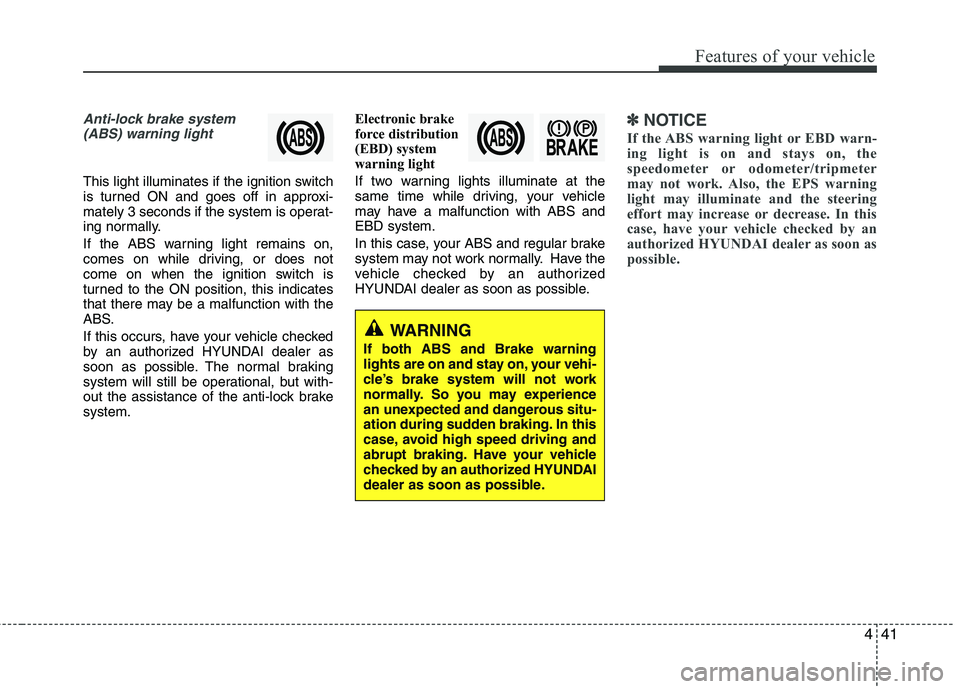
441
Features of your vehicle
Anti-lock brake system(ABS) warning light
This light illuminates if the ignition switch
is turned ON and goes off in approxi-
mately 3 seconds if the system is operat-
ing normally.
If the ABS warning light remains on,
comes on while driving, or does not
come on when the ignition switch is
turned to the ON position, this indicates
that there may be a malfunction with the
ABS.
If this occurs, have your vehicle checked
by an authorized HYUNDAI dealer as
soon as possible. The normal braking
system will still be operational, but with-
out the assistance of the anti-lock brake
system. Electronic brake
force distribution
(EBD) system
warning light
If two warning lights illuminate at the
same time while driving, your vehicle
may have a malfunction with ABS and
EBD system.
In this case, your ABS and regular brake
system may not work normally. Have the
vehicle checked by an authorized
HYUNDAI dealer as soon as possible.
✽ ✽
NOTICE
If the ABS warning light or EBD warn-
ing light is on and stays on, the
speedometer or odometer/tripmeter
may not work. Also, the EPS warning
light may illuminate and the steering
effort may increase or decrease. In this
case, have your vehicle checked by an
authorized HYUNDAI dealer as soon as
possible.
WARNING
If both ABS and Brake warning
lights are on and stay on, your vehi-
cle’s brake system will not work
normally. So you may experience
an unexpected and dangerous situ-
ation during sudden braking. In this
case, avoid high speed driving and
abrupt braking. Have your vehicle
checked by an authorized HYUNDAI
dealer as soon as possible.
Page 330 of 382
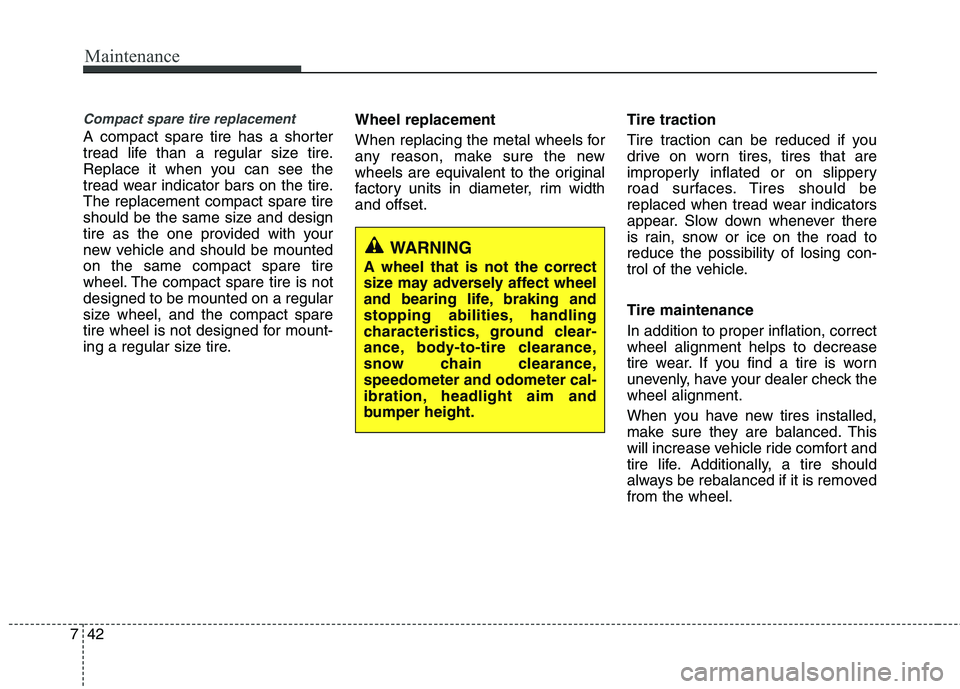
Maintenance
42
7
Compact spare tire replacement
A compact spare tire has a shorter
tread life than a regular size tire.
Replace it when you can see the
tread wear indicator bars on the tire.
The replacement compact spare tire
should be the same size and design
tire as the one provided with your
new vehicle and should be mounted
on the same compact spare tire
wheel. The compact spare tire is not
designed to be mounted on a regular
size wheel, and the compact spare
tire wheel is not designed for mount-
ing a regular size tire. Wheel replacement
When replacing the metal wheels for
any reason, make sure the new
wheels are equivalent to the original
factory units in diameter, rim width
and offset.
Tire traction
Tire traction can be reduced if you
drive on worn tires, tires that are
improperly inflated or on slippery
road surfaces. Tires should be
replaced when tread wear indicators
appear. Slow down whenever there
is rain, snow or ice on the road to
reduce the possibility of losing con-
trol of the vehicle.
Tire maintenance
In addition to proper inflation, correct
wheel alignment helps to decrease
tire wear. If you find a tire is worn
unevenly, have your dealer check the
wheel alignment.
When you have new tires installed,
make sure they are balanced. This
will increase vehicle ride comfort and
tire life. Additionally, a tire should
always be rebalanced if it is removed
from the wheel.
WARNING
A wheel that is not the correct
size may adversely affect wheel
and bearing life, braking and
stopping abilities, handling
characteristics, ground clear-
ance, body-to-tire clearance,
snow chain clearance,
speedometer and odometer cal-
ibration, headlight aim and
bumper height.
Page 377 of 382
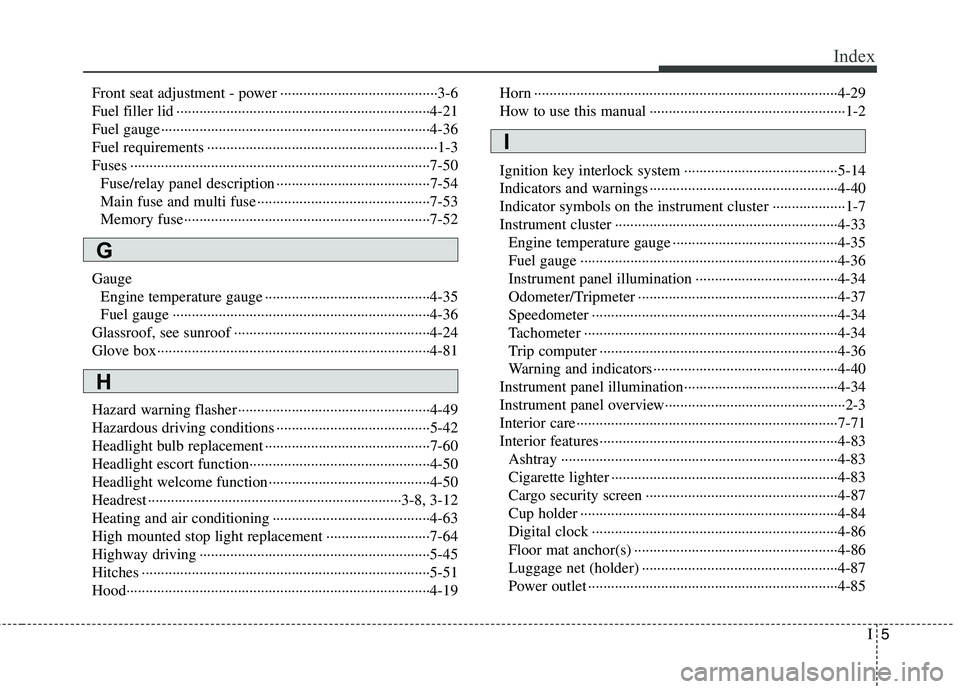
I5
Index
Front seat adjustment - power ··················\
··················\
·····3-6
Fuel filler lid ··················\
··················\
··················\
············4-21
Fuel gauge··················\
··················\
··················\
················4-36
Fuel requirements ··················\
··················\
··················\
······1-3
Fuses ··················\
··················\
··················\
··················\
······7-50Fuse/relay panel description ··················\
··················\
····7-54
Main fuse and multi fuse ··················\
··················\
·········7-53
Memory fuse··················\
··················\
··················\
··········7-52
Gauge Engine temperature gauge ··················\
··················\
·······4-35
Fuel gauge ··················\
··················\
··················\
·············4-36
Glassroof, see sunroof ··················\
··················\
···············4-24
Glove box··················\
··················\
··················\
·················4-81\
Hazard warning flasher ··················\
··················\
··············4-49
Hazardous driving conditions ··················\
··················\
····5-42
Headlight bulb replacement ··················\
··················\
·······7-60
Headlight escort function··················\
··················\
···········4-50
Headlight welcome function··················\
··················\
······4-50
Headrest ··················\
··················\
··················\
············3-8, 3-12
Heating and air conditioning ··················\
··················\
·····4-63
High mounted stop light replacement ··················\
·········7-64
Highway driving ··················\
··················\
··················\
······5-45
Hitches ··················\
··················\
··················\
··················\
···5-51
Hood··················\
··················\
··················\
··················\
·······4-19 Horn ··················\
··················\
··················\
··················\
·······4-29
How to use this manual ··················\
··················\
···············1-2
Ignition key interlock system ··················\
··················\
····5-14
Indicators and warnings ··················\
··················\
·············4-40
Indicator symbols on the instrument cluster ··················\
·1-7
Instrument cluster ··················\
··················\
··················\
····4-33
Engine temperature gauge ··················\
··················\
·······4-35
Fuel gauge ··················\
··················\
··················\
·············4-36
Instrument panel illumination ··················\
··················\
·4-34
Odometer/Tripmeter ··················\
··················\
················4-37
Speedometer ··················\
··················\
··················\
··········4-34
Tachometer ··················\
··················\
··················\
············4-34
Trip computer ··················\
··················\
··················\
········4-36
Warning and indicators ··················\
··················\
············4-40
Instrument panel illumination··················\
··················\
····4-34
Instrument panel overview··················\
··················\
···········2-3
Interior care··················\
··················\
··················\
··············7-71
Interior features··················\
··················\
··················\
········4-83 Ashtray ··················\
··················\
··················\
··················\
4-83
Cigarette lighter ··················\
··················\
··················\
·····4-83
Cargo security screen ··················\
··················\
··············4-87
Cup holder ··················\
··················\
··················\
·············4-84
Digital clock ··················\
··················\
··················\
··········4-86
Floor mat anchor(s) ··················\
··················\
·················4-86\
Luggage net (holder) ··················\
··················\
···············4-87
Power outlet ··················\
··················\
··················\
···········4-85
G
I
H
Page 379 of 382
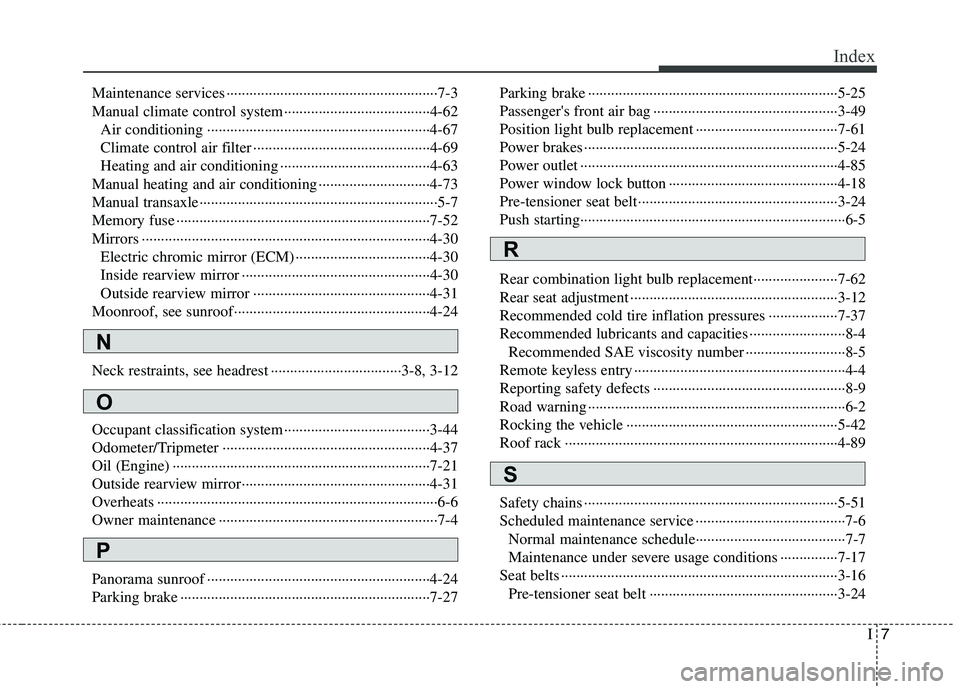
I7
Index
Maintenance services ··················\
··················\
··················\
·7-3
Manual climate control system··················\
··················\
··4-62Air conditioning ··················\
··················\
··················\
····4-67
Climate control air filter ··················\
··················\
··········4-69
Heating and air conditioning ··················\
··················\
···4-63
Manual heating and air conditioning ··················\
···········4-73
Manual transaxle··················\
··················\
··················\
········5-7
Memory fuse ··················\
··················\
··················\
············7-52
Mirrors ··················\
··················\
··················\
··················\
···4-30 Electric chromic mirror (ECM) ··················\
·················4-30\
Inside rearview mirror ··················\
··················\
·············4-30
Outside rearview mirror ··················\
··················\
··········4-31
Moonroof, see sunroof··················\
··················\
···············4-24
Neck restraints, see headrest ··················\
················3-8, 3-12
Occupant classification system ··················\
··················\
··3-44
Odometer/Tripmeter ··················\
··················\
··················\
4-37
Oil (Engine) ··················\
··················\
··················\
·············7-21
Outside rearview mirror··················\
··················\
·············4-31
Overheats ··················\
··················\
··················\
··················\
·6-6
Owner maintenance ··················\
··················\
··················\
···7-4
Panorama sunroof ··················\
··················\
··················\
····4-24
Parking brake ··················\
··················\
··················\
···········7-27 Parking brake ··················\
··················\
··················\
···········5-25
Passenger's front air bag ··················\
··················\
············3-49
Position light bulb replacement ··················\
··················\
·7-61
Power brakes ··················\
··················\
··················\
············5-24
Power outlet ··················\
··················\
··················\
·············4-85
Power window lock button ··················\
··················\
········4-18
Pre-tensioner seat belt··················\
··················\
················3-24
Push starting··················\
··················\
··················\
···············6-5
Rear combination light bulb replacement··················\
····7-62
Rear seat adjustment ··················\
··················\
··················\
3-12
Recommended cold tire inflation pressures ··················\
7-37
Recommended lubricants and capacities ··················\
·······8-4
Recommended SAE viscosity number ··················\
········8-5
Remote keyless entry ··················\
··················\
··················\
·4-4
Reporting safety defects ··················\
··················\
··············8-9
Road warning ··················\
··················\
··················\
·············6-2
Rocking the vehicle ··················\
··················\
··················\
·5-42
Roof rack ··················\
··················\
··················\
·················4-89\
Safety chains ··················\
··················\
··················\
············5-51
Scheduled maintenance service ··················\
··················\
···7-6 Normal maintenance schedule··················\
··················\
···7-7
Maintenance under severe usage conditions ···············7-17
Seat belts ··················\
··················\
··················\
··················\
3-16
Pre-tensioner seat belt ··················\
··················\
·············3-24
N
O
P
R
S